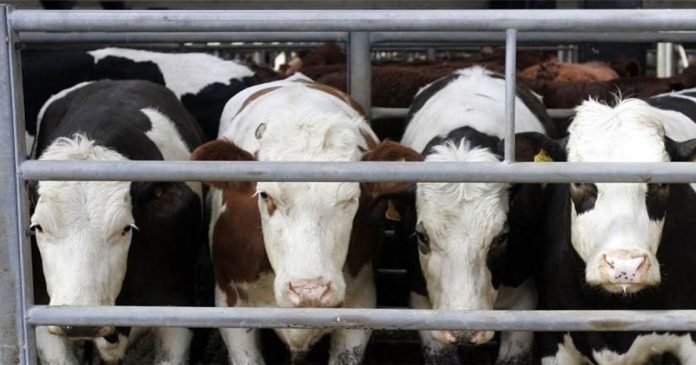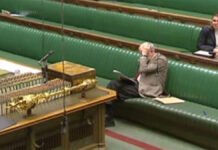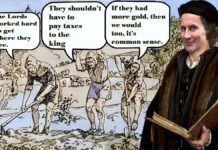The UK is to become the first country in Europe to ban live animal exports.
Reducing maximum journey times and increasing space and headroom are among the measures welcomed by animal welfare campaigners.
Exporting live animals for slaughter and fattening will be banned under new plans.
A government consultation has been launched aimed at ending the practice in England and Wales, which officials said could not be stopped while the UK was part of the EU.
Environment Secretary George Eustice said the ban could be in force by the end of 2021 in a post-Brexit break from EU trade rules.
The RSPCA welcomed the move, saying it would be “a landmark achievement for animal welfare”.
Chris Sherwood, the RSPCA’s chief executive, said: “There is absolutely no reasonable justification to subject an animal to an unnecessarily stressful journey abroad simply for them to be fattened for slaughter.
“Ending live exports for slaughter and further fattening would be a landmark achievement for animal welfare.”
Peter Stevenson, Compassion in World Farming’s chief policy adviser, said the “unambiguous proposal” was very welcome.
“We urge farmers not to oppose the proposed ban but rather to recognise that this is an important part of moving forward to a high welfare future.”
One local authority in Kent tried to ban the exports in 2012 after a lorry full of lame sheep was found at the local port and the animals had to be put down.
But the High Court overturned the ban, saying it was a breach of EU free trade rules.
Only a few thousand of the millions of animals bred for meat in the UK end up being shipped to Europe for slaughter.
But the government said now the UK has left the EU – and will stop following its rules after the post-Brexit transition period ends on 31 December – a ban can be introduced.
Its consultation will also look at further elements of animal welfare in transport, such as reducing maximum journey times, giving animals more space and headroom during transport, and stricter rules on transporting animals in extreme temperatures or by sea.
It is understood from a UK government source that the joint consultation will be used as the basis for discussions with Scotland. Those discussions, and the consultation findings, will then be used to examine ways of harmonising the ban.
However, live exports look set to continue in Northern Ireland which “will continue to follow EU legislation on animal welfare in transport for as long as the Northern Ireland protocol is in place”, according to Defra (Department for Environment, Food and Rural Affairs).
Poultry exports also appear set to continue, Defra added: “The measure on live exports will not impact on poultry exports or exports for breeding purposes.” The UK exports tens of millions of chicks a year in an industry that was worth £139m in 2018.
If you are an EU citizen: urge European Commissioners stop exports from the EU to non-EU countries.
The European Commission is currently complicit in the cruelty of live animal exports. Please add your voice and tell them to take action.
Every year, millions of animals are exported from the EU to Turkey, the Middle East and North Africa. This long distance transport for slaughter or fattening is an abhorrent trade. It’s beyond time for the European Commission to propose legislation that would bring this abuse and suffering to an end.
During transport over such incredibly long distances, animals may face extreme dehydration, exhaustion and hunger. Some collapse onto floors that are covered in faeces and urine, and risk being trampled by their companions. Once they leave the EU, these animals may also face inhumane, unskilled handling and unimaginably horrific slaughter.
It is within the power of the European Commission – and the Commission alone – to propose legislation to ban live exports from the EU. Please sign the petition now. Tell the EU that we will no longer stand for animals being treated so cruelly.
Support Independent Journalism Today
Our unwavering dedication is to provide you with unbiased news, diverse perspectives, and insightful opinions. We're on a mission to ensure that those in positions of power are held accountable for their actions, but we can't do it alone. Labour Heartlands is primarily funded by me, Paul Knaggs, and by the generous contributions of readers like you. Your donations keep us going and help us uphold the principles of independent journalism. Join us in our quest for truth, transparency, and accountability – donate today and be a part of our mission!
Like everyone else, we're facing challenges, and we need your help to stay online and continue providing crucial journalism. Every contribution, no matter how small, goes a long way in helping us thrive. By becoming one of our donors, you become a vital part of our mission to uncover the truth and uphold the values of democracy.
While we maintain our independence from political affiliations, we stand united against corruption, injustice, and the erosion of free speech, truth, and democracy. We believe in the power of accurate information in a democracy, and we consider facts non-negotiable.
Your support, no matter the amount, can make a significant impact. Together, we can make a difference and continue our journey toward a more informed and just society.
Thank you for supporting Labour Heartlands












